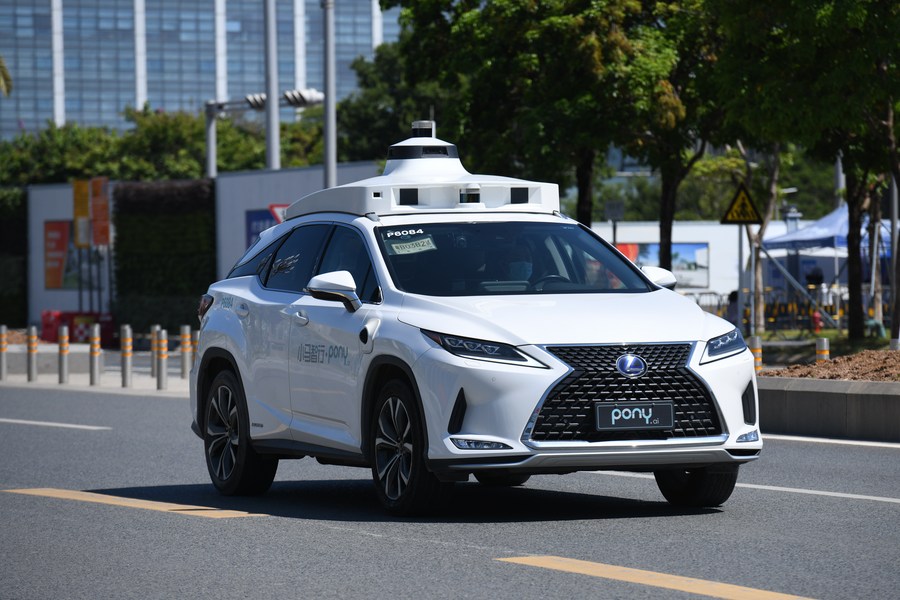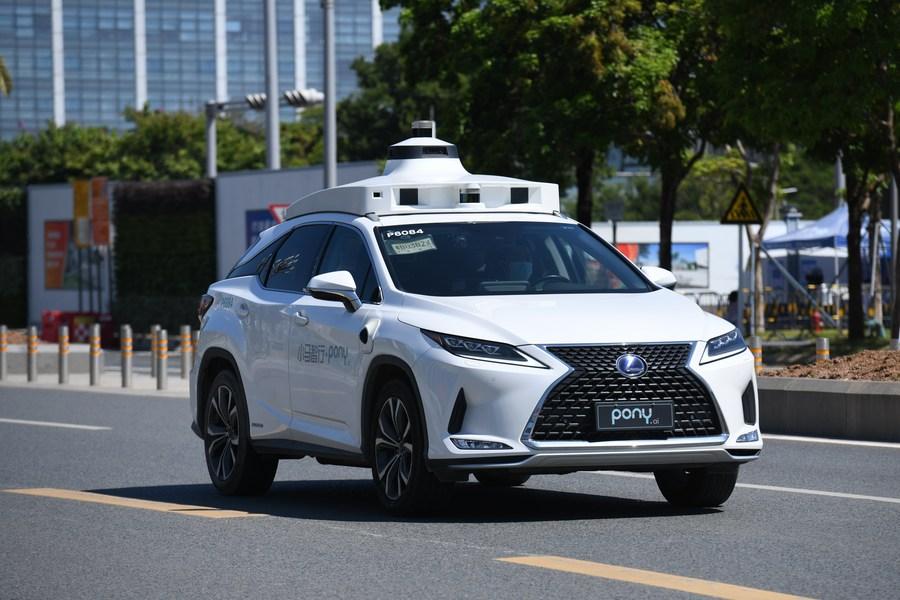
An autonomous vehicle runs on a road in Shenzhen, south China's Guangdong Province, Aug. 1, 2022. (Xinhua/Liang Xu)
BEIJING, Aug. 11 (Xinhua) -- China is seeing accelerated commercialization of automatic driving, with pilot projects recently kicking off in Wuhan and Chongqing.
Supporting policies issued by Chinese authorities further give a boost to the commercial operation of automatic driving industry.
With stronger policy support, many enterprises are stepping up efforts to propel the commercialization of automatic driving business.
-- Commercial operation pilots
Chongqing and Wuhan recently issued policies on piloting commercial operation of fully unmanned automatic driving business, allowing autonomous vehicles (AVs) without safety supervisors inside the car to offer commercial service to the public on open roads.
The service areas cover 13 square kilometers in the Wuhan Economic & Technological Development Zone, and 30 square kilometers in Chongqing's Yongchuan.
Driverless vehicles have already been on roads in China, but safety supervisors are required to be present inside the car.
The fully unmanned automatic driving pilots in Chongqing and Wuhan will further promote the commercialization of automatic driving, said industry insiders.
The pilots make China the second country after the U.S. to provide fully driverless commercial service, said an executive of Chinese tech giant Baidu, which has secured permits to offer such service in Wuhan and Chongqing.
China is expected to see large-scale application of automatic driving in around 2025 to 2026, according to the executive.
-- Supporting policies
China has rolled out a series of policies to boost the development and commercialization of automatic driving in recent years.
As early as February 2020, authorities including the National Development and Reform Commission and the Ministry of Industry and Information Technology jointly issued a guideline on the strategy for the innovative development of smart vehicles. The document made it clear to accelerate the development of high-level automatic driving.
On August 2, the Ministry of Natural Resources released a notice specifying to carry out pilot projects for high-precision map application of intelligent connected vehicles in Beijing, Shanghai, Guangzhou, Shenzhen, Hangzhou and Chongqing.
On August 8, the Ministry of Transport began soliciting opinions on drafted rules to regulate the self-driving industry. According to the draft, the ministry will encourage the use of AVs as taxis in easily controlled scenarios in low traffic situations.
At local level, in April, Beijing green-lighted the pilot commercial operation of self-driving passenger vehicles without anyone in the driver's seat. The first batch of 14 driverless cars, with safety supervisors in the front passenger seat rather than in the driver's seat with passengers aboard previously, hit the road under the pilot commercial operation.
The southern metropolis of Shenzhen on August 1 allowed fully autonomous vehicles without drivers to run on certain roads as a local regulation on smart and internet-connected vehicles went into effect.
The new regulation would help autonomous driving companies improve their technology levels and accelerate the commercialization of autonomous driving, said Maxwell Zhou, CEO of the Shenzhen-based autonomous driving start-up DeepRoute.ai.
-- Growing market
With stronger policy support, many enterprises are stepping up efforts to propel the commercialization of automatic driving business.
Having been granted by Chongqing and Wuhan, Apollo Go, Baidu's autonomous ride-hailing service, provides paid services for fully driverless robotaxis in designated areas in each of the two cities.
To receive the permits, Baidu's robotaxis have undergone multiple steps of testing and licensing, starting from tests carried out with a safety operator in the driver's seat to a safety operator in the passengers' seats, before finally receiving authorization to operate AVs with no human drivers or operators in the vehicle, the company said.
Currently, Baidu's driverless robotaxis service is available in Beijing, Shanghai, Guangzhou and Shenzhen, with the number of orders exceeding one million.
Autox, a Chinese driverless taxi service provider, has set up ten operation centers in cities like Shenzhen, Shanghai, Guangzhou and Beijing to support the operation of local driverless fleets. At present, the number of AutoX driverless taxis operating on open roads stands at more than 1,000.
By 2040, the potential market scale of unmanned taxis is likely to reach 3.2 trillion yuan, and that of commercial vehicle autonomous driving will be about 3 trillion yuan, according to CITIC Securities.
Travel service companies that adopt automatic driving systems will see their total costs continue decreasing, likely starting from 2025, and the commercialization speed and riding experience of domestic driverless taxis will continue beating market expectations, according to a research report compiled by China International Capital Corporation Limited(CICC). (Edited by Su Dan with Xinhua Silk Road, sudan@xinhua.org)




 A single purchase
A single purchase









